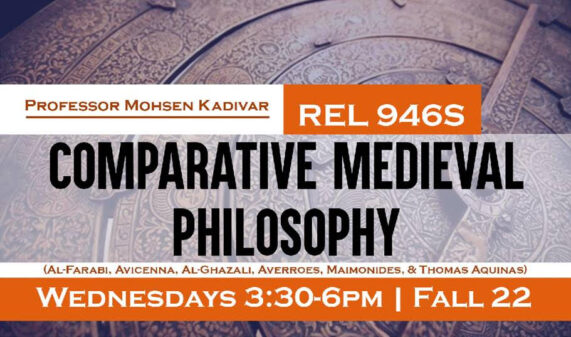Duke University
Department of Religious Studies
RELIGION 946.01
Comparative Medieval Philosophy
Fall 2022
Instructor: Professor Mohsen Kadivar
Wednesdays, 3:30-6:00 PM, Venue: Gray 319

This course offers comparative medieval philosophy in three Abrahamic traditions. Although medieval philosophy was in interaction with theology, the theological subjects were discussed by philosophical approach and methodology. Medieval philosophy is the bridge between ancient and modern philosophy. Modern philosophy could not be understood well without elaboration on this period. Medieval philosophy is a rich period of rational thinking. It is the prerequisite to understanding the theology of Abrahamic traditions, metaphysics, philosophical psychology, and political philosophy.
The best approach to medieval philosophy is comparative studies. Jewish and Christian medieval philosophy could not be understood correctly without learning Islamic medieval philosophy. On the other hand, Islamic philosophy could not be understood well without Platonic, Aristotelian, and neo-Platonic philosophies. Although we have non-believer, Jewish, Christian, or Muslim philosophers, their philosophies are so close to each other, under influence of their predecessors – regardless of their traditions – and influential to their successors.
In the chain of philosophers of the medieval period, we have six top philosophers: Alfarabi (870-950), Avicenna (980-1037), al-Ghazali (1058-1111), Averroes (1126-1198), Maimonides (1138-1204), and Thomas Aquinas (1225-1274). Although the first four were Muslims, Maimonides was Jew and Aquinas was Christian, comparative study will teach us that they were in the same camp, using almost the same method, and usually reached the same result. It is obvious that each of them was under influence of his specific tradition too.
The course will start with general remarks on the translation movement from Arabic to Western languages, Islamic philosophy, Jewish philosophy, Christian philosophy, and the guidelines of metaphysic, ethics, and political philosophy in this period. The first part of the course offers two issues: first general information about these distinguished philosophers, their works, and their philosophical innovations; second reading the translation of a few of their major works. The second part offers comparative studies on three important subjects: God, creation, and freedom in three traditions, focusing on Avicenna, Averroes, Maimonides, and Aquinas in detail.

